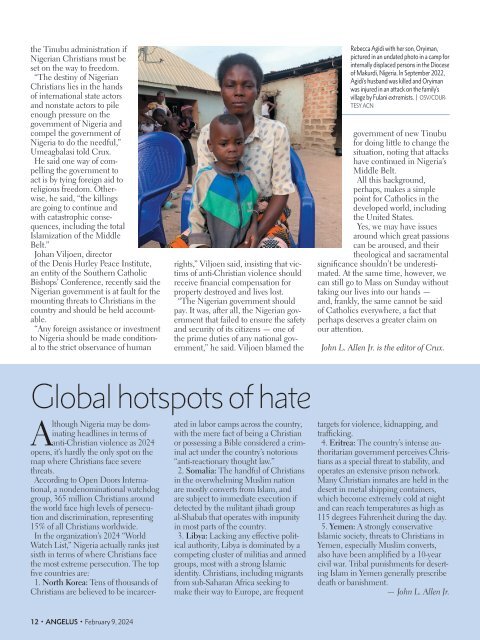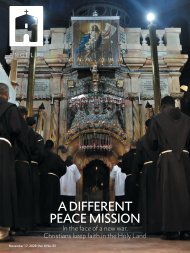Angelus News | February 9, 2024 | Vol. 9 No
On the cover: Catholic worshippers recite lines during the Stations of the Cross prayers at the Holy Cross Cathedral in Lagos, Nigeria, on Feb. 24, 2023. On Page 10, John Allen takes a closer look at the unfolding pattern of violence targeting Catholics there, and what it means for the universal Church.
On the cover: Catholic worshippers recite lines during the Stations of the Cross prayers at the Holy Cross Cathedral in Lagos, Nigeria, on Feb. 24, 2023. On Page 10, John Allen takes a closer look at the unfolding pattern of violence targeting Catholics there, and what it means for the universal Church.
Create successful ePaper yourself
Turn your PDF publications into a flip-book with our unique Google optimized e-Paper software.
the Tinubu administration if<br />
Nigerian Christians must be<br />
set on the way to freedom.<br />
“The destiny of Nigerian<br />
Christians lies in the hands<br />
of international state actors<br />
and nonstate actors to pile<br />
enough pressure on the<br />
government of Nigeria and<br />
compel the government of<br />
Nigeria to do the needful,”<br />
Umeagbalasi told Crux.<br />
He said one way of compelling<br />
the government to<br />
act is by tying foreign aid to<br />
religious freedom. Otherwise,<br />
he said, “the killings<br />
are going to continue and<br />
with catastrophic consequences,<br />
including the total<br />
Islamization of the Middle<br />
Belt.”<br />
Johan Viljoen, director<br />
of the Denis Hurley Peace Institute,<br />
an entity of the Southern Catholic<br />
Bishops’ Conference, recently said the<br />
Nigerian government is at fault for the<br />
mounting threats to Christians in the<br />
country and should be held accountable.<br />
“Any foreign assistance or investment<br />
to Nigeria should be made conditional<br />
to the strict observance of human<br />
rights,” Viljoen said, insisting that victims<br />
of anti-Christian violence should<br />
receive financial compensation for<br />
property destroyed and lives lost.<br />
“The Nigerian government should<br />
pay. It was, after all, the Nigerian government<br />
that failed to ensure the safety<br />
and security of its citizens — one of<br />
the prime duties of any national government,”<br />
he said. Viljoen blamed the<br />
Rebecca Agidi with her son, Oryiman,<br />
pictured in an undated photo in a camp for<br />
internally displaced persons in the Diocese<br />
of Makurdi, Nigeria. In September 2022,<br />
Agidi’s husband was killed and Oryiman<br />
was injured in an attack on the family’s<br />
village by Fulani extremists. | OSV/COUR-<br />
TESY ACN<br />
government of new Tinubu<br />
for doing little to change the<br />
situation, noting that attacks<br />
have continued in Nigeria’s<br />
Middle Belt.<br />
All this background,<br />
perhaps, makes a simple<br />
point for Catholics in the<br />
developed world, including<br />
the United States.<br />
Yes, we may have issues<br />
around which great passions<br />
can be aroused, and their<br />
theological and sacramental<br />
significance shouldn’t be underestimated.<br />
At the same time, however, we<br />
can still go to Mass on Sunday without<br />
taking our lives into our hands —<br />
and, frankly, the same cannot be said<br />
of Catholics everywhere, a fact that<br />
perhaps deserves a greater claim on<br />
our attention.<br />
John L. Allen Jr. is the editor of Crux.<br />
Global hotspots of hate<br />
Although Nigeria may be dominating<br />
headlines in terms of<br />
anti-Christian violence as <strong>2024</strong><br />
opens, it’s hardly the only spot on the<br />
map where Christians face severe<br />
threats.<br />
According to Open Doors International,<br />
a nondenominational watchdog<br />
group, 365 million Christians around<br />
the world face high levels of persecution<br />
and discrimination, representing<br />
15% of all Christians worldwide.<br />
In the organization’s <strong>2024</strong> “World<br />
Watch List,” Nigeria actually ranks just<br />
sixth in terms of where Christians face<br />
the most extreme persecution. The top<br />
five countries are:<br />
1. <strong>No</strong>rth Korea: Tens of thousands of<br />
Christians are believed to be incarcerated<br />
in labor camps across the country,<br />
with the mere fact of being a Christian<br />
or possessing a Bible considered a criminal<br />
act under the country’s notorious<br />
“anti-reactionary thought law.”<br />
2. Somalia: The handful of Christians<br />
in the overwhelming Muslim nation<br />
are mostly converts from Islam, and<br />
are subject to immediate execution if<br />
detected by the militant jihadi group<br />
al-Shabab that operates with impunity<br />
in most parts of the country.<br />
3. Libya: Lacking any effective political<br />
authority, Libya is dominated by a<br />
competing cluster of militias and armed<br />
groups, most with a strong Islamic<br />
identity. Christians, including migrants<br />
from sub-Saharan Africa seeking to<br />
make their way to Europe, are frequent<br />
targets for violence, kidnapping, and<br />
trafficking.<br />
4. Eritrea: The country’s intense authoritarian<br />
government perceives Christians<br />
as a special threat to stability, and<br />
operates an extensive prison network.<br />
Many Christian inmates are held in the<br />
desert in metal shipping containers,<br />
which become extremely cold at night<br />
and can reach temperatures as high as<br />
115 degrees Fahrenheit during the day.<br />
5. Yemen: A strongly conservative<br />
Islamic society, threats to Christians in<br />
Yemen, especially Muslim converts,<br />
also have been amplified by a 10-year<br />
civil war. Tribal punishments for deserting<br />
Islam in Yemen generally prescribe<br />
death or banishment.<br />
— John L. Allen Jr.<br />
12 • ANGELUS • <strong>February</strong> 9, <strong>2024</strong>

















